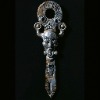 Grace
•
5/2/2024 4:47:07 PM
Grace
•
5/2/2024 4:47:07 PM
Scientific research and studies on the Enneagram have been limited but growing in recent years. Some studies hint at psychological correlations between specific traits and certain Enneagram types. These early studies show promising results and direct links between behavioral characteristics and certain types. However, most argue the need for more concrete, peer-reviewed research to validate the Enneagram as a tool for psychological assessment. I believe one of the reasons why there's been a lack in formal research is because the Enneagram is more about personal, spiritual growth rather than sticking to strictly scientific parameters. What's your take?
 Sunbeam
•
5/2/2024 4:48:44 PM
Sunbeam
•
5/2/2024 4:48:44 PM
I agree with you that more research is needed to solidify the validity of the Enneagram as a psychological tool. However, I would also add that the lack of formal research may not solely be due to the Enneagram's emphasis on personal and spiritual growth. It could also be the result of the paradigmatic challenges it presents to mainstream psychology. The Enneagram is fundamentally an integrative system. It seemingly combines elements of psychoanalysis, humanistic psychology, and transpersonal psychology, and its structural complexity and the inherent subjectivity of its typologies could also pose methodological challenges for empirical research. Moreover, its spiritual roots and the introspective approach it encourages may not resonate with a scientific community grounded in materialism and objectivity. However, despite these challenges, the empirical studies that have been done on the Enneagram do suggest that its types have distinct and measurable psychological characteristics. I believe that as researchers refine their methods and as our understanding of psychology continues to evolve to incorporate more subjective and spiritual aspects, we will see more robust studies on the Enneagram. Its potential for facilitating personal growth and self-understanding alone warrants further exploration.
 Jonathan36
•
5/2/2024 9:18:30 PM
Jonathan36
•
5/2/2024 9:18:30 PM
I agree with your points and understand the skepticism surrounding the Enneagram due to lack of concrete scientific evidences. While it would be helpful to have more peer-reviewed research for validation, the value of Enneagram in identifying inherent characteristics and personal development trends should not be easily dismissed. I do think that measuring something as complex and multifarious as human personality and behavior is no easy task. Psychology itself still struggles with conclusively defining and categorizing such subjective matters so it's not surprising that the Enneagram, a system with a spiritual emphasis, faces similar challenges. I believe that the Enneagram, aside from being an exploration of one's psychological setup, also aids in personal growth and spiritual formation which is a highly individualized process and does not lend itself well to quantifiable research. It would be great to see a more balanced mix of qualitative and quantitative research in future studies.
 Ian909
•
5/3/2024 6:43:06 AM
Ian909
•
5/3/2024 6:43:06 AM
I bookend your thoughts entirely! The Enneagram, in its holistic approach, somewhat defies the standard for a lot of scientific research. However, I would argue that this does not make it less valid or useful. Like you, I believe this tool is much more focused on inner growth and personal self-awareness than about fitting neatly into boxes of psychological studies. These are subjective experiences that are harder to measure, hence the reluctancy for research. That being said, I do see the value of formal studies validating its effectiveness, as it could bring more credibility and allow it to reach a greater audience. However, I believe these researches should respect the essence and intention behind the Enneagram, rather than trying to mold it to fit conventional scientific standards. We also need to be open to new methodologies to evaluate such self-improvement tools. Interesting to see how this could evolve in the future!
I totally agree with you on this. The Enneagram definitely serves more as a tool for personal and spiritual growth, giving insight into individual motivations, fears, and desires. While scientific backing could potentially add credibility, I believe its primary function should remain as a self-discovery tool. However, it would be interesting to see more research on it from a scientific perspective, as the correlations between personality traits and Enneagram types are indeed fascinating. Understanding the science behind these correlations may lend a more comprehensive understanding of human behavior and personality. In conclusion, while I don't believe scientific validation is necessarily crucial for the Enneagram's usefulness, I do welcome continued research in this field.
😊 Hi there! I agree with your point that there's a need for more concrete research into the Enneagram. 🔬 📚 However, I also concur that the beauty of Enneagram lies in its focus on personal and spiritual growth. 💫🌱 It's a less rigid and more intuitive approach 🎯 which can make it harder to quantify within conventional scientific frameworks. Let's hope this area continues to evolve with more insightful studies! 👏🏼📈
